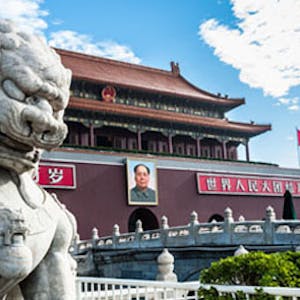This course offers a comprehensive understanding of China's political landscape, emphasizing the interplay between politics and economics. Through a conceptual framework, it evaluates the influence of state and party officials on economic development, examining both positive and negative outcomes.
Participants gain insight into the origins, backgrounds, and decision-making processes of Chinese leaders, as well as the strategies employed by citizens to influence political decisions. The course also assesses China's future trajectory, contemplating the impact of rapid economic development and the emergence of a vibrant middle class on the country's political system.
Comprising seven modules, the course covers topics such as the Chinese political system, elite politics, policy process, societal engagement, domestic and international political economy, and potential scenarios for China's future – from democratization to "flexible authoritarianism."
Certificate Available ✔
Get Started / More Info
This course comprises seven modules that cover the Chinese political system, elite politics, policy process, societal engagement, domestic and international political economy, and potential future scenarios for China.
This module provides an overview of the Chinese political system, examining models and structures, party organizations, government, legislature, military, and the judiciary. Participants will explore the key components of the system and its categorization, preparing them for in-depth analysis in subsequent modules.
Delving into elite politics, this module explores how leadership values, conflict structures, and political stability impact economics and business. Participants will examine the selection and succession of leaders, the influence of retired and new leaders, and the international experience of top Chinese leaders.
Module 3 delves into the policy process in Chinese politics, analyzing the selection, decision-making, and implementation of policies. Participants will explore the impact of social interests, policy failures and successes, as well as engage in peer-reviewed written assignments to deepen their understanding.
This module focuses on societal engagement in politics, examining political culture, modes of participation, group politics, collective action, and protest. Participants will explore the various social groups involved in politics and assess the political culture in rural China.
Exploring China's domestic and international political economy, this module covers the impact of reforms on rural income, the role of the public sector, central-local financial relations, and China as a "trading state." Participants will engage in peer-reviewed written assignments to assess their comprehension.
Contemplating China's future, this module presents potential scenarios for democratization or "flexible authoritarianism." Participants will analyze the forces for and against political development, the constraints on society and ideology, and the potential sources of political instability.
The final module encompasses the course's final exam and evaluation, allowing participants to demonstrate their grasp of the course material and providing feedback on their learning experience.
Anti-Racism is a three-course specialization that equips learners with the knowledge and skills to engage in conversations about race, racism, and anti-racism.
"The Fundamentals of Diversity" course provides essential tools for navigating diversity in organizations. Learners will gain a comprehensive understanding...
MaaS: Adoption and Use is a course that equips learners with the skills to evaluate the potential of Mobility as a Service (MaaS) for urban areas, focusing on data...
Understanding Europe offers a comprehensive exploration of the European Union's impact on everyday life. It delves into the EU's functions, challenges myths, and...